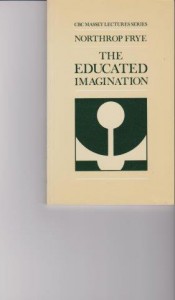(required reading for anyone who is a secondary English teacher, English lecturer or English prof, or training to be)
……………………………………………………………………………..
Northrop Frye, that is. Our genius literary critic.
“I think there are all questions and there aren’t any answers.”
“The word ‘classic’ as applied to a work of literature means primarily a work that refuses to go away, that remains confronting us until we do something about it, which means also doing something about ourselves.”
“To increase consciousness is to increase mobility by metaphor.”
“The aim of education is to distinguish illusion from reality.”
“Education is loaded with an apparatus of magical systems and methods which are supposed to inscribe significant patterns on the student’s tabula rasa.”
“If you want to smash human freedom, the first thing you have to do is to smash language, because people will always be free as long as they have the words to form ideas freely.”
“Individuality, which is the condition of freedom, is never achieved without some genuine form of education.”
“In literature the sense of fact is subordinated to an ultimate intention of producing a pattern of words for its own sake.”
“The poet does not think of himself as making his poems. He thinks of himself as a place where poems happen.”
“…every beginning that matters is verbal and conscious.”
“The ‘real me’ may be a layer of personae, the relationships with people.”
“There’s only one story–the story of your life.”
“The central story of all literature is the loss and regaining of identity.”
“In a sense I don’t believe anything I say until I hear myself saying it.”
“The reality-illusion distinction clearly does not work for plays: the illusion is the reality.”
“Thinking, of course, is not something I do: it’s something that happens where I am.”
“There are no wordless thoughts.”
“…all understanding is in a sense metaphorical understanding.”
……………………………………………………………………………………………………………………..
(excerpts from the highly-recommended John Robert Columbo’s excellent compilation The Northrop Frye Book (Dundurn,2014)

